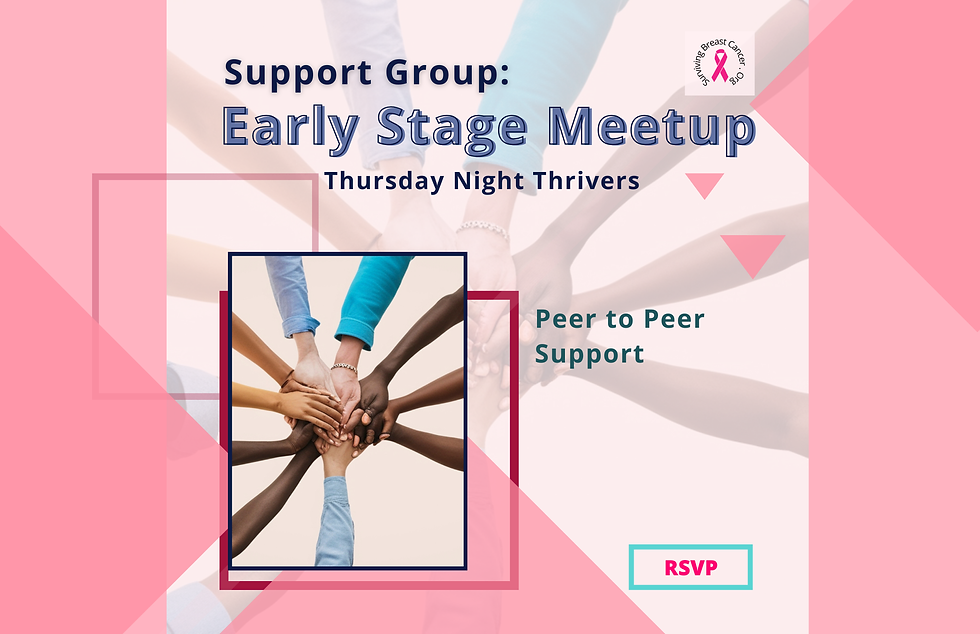Breast Cancer and Cold and Flu Season
- Laura Carfang, Ed.D.

- Aug 7, 2022
- 4 min read
Updated: Sep 9, 2025

While COVID-19 continues to concern immunocompromised individuals, the regular cold and flu season also deserves careful attention. This season typically begins in October and peaks between December and March. While colds and the flu are simply an unpleasant nuisance to most, those who are immunocompromised, such as those with breast cancer, are at a higher risk of complications. Luckily, many of the same precautions people grew accustomed to during the pandemic can also help protect you from and limit the spread of colds and the flu. These precautions include:
Wearing a face mask
Staying home when you feel sick
Regular hand washing
Getting an annual flu shot if your recommended by your doctor
Explore the resources below for more information on the importance of vigilance and viral protection for breast cancer patients during cold and flu season, plus advice for if you do get sick.
Nutrition Guide For Breast Cancer
The right nutrition and exercise can help support your immune system to avoid colds and the flu. Read more for suggestions of foods that can boost your immunity. Read More.
From Around The Web
“The biggest concern [around the flu] is that cancer patients are at a higher risk of developing serious complications if they do get the flu. So if you have cancer and start experiencing symptoms like a fever, runny nose, sore throat or coughing — especially if you have a compromised immune system — see a doctor right away. There’s a good treatment for the flu, but it has to be administered early, within 48 to 72 hours of the onset of symptoms. If you suspect you might have the flu, you should also be checked for other viruses.”
Oseltamivir, sold under the brand name Tamiflu, is safe for everyone who has tested positive for the flu, including cancer patients. Additionally, it’s safe for patients with any type of cancer to get the flu vaccine. However, the vaccine doesn’t work as well among cancer patients as it does in those without cancer, particularly those on active treatment. “It’s also important for cancer patients to get the shot, as opposed to the nasal mist, because the mist is a live-attenuated vaccine and may actually cause the flu in immunocompromised patients and not be as effective as the shot.” Read More.
“Why is the common cold important for cancer patients? The body’s primary defense against the common cold is the white blood cells that make up the immune system. Not everyone gets every cold. If you have a strong immune system, you are less likely to contract a cold virus, even if you are exposed to it.
Cancer patients have weakened immune systems. Specifically, cancer patients may have abnormally low levels of neutrophils in the circulating blood, a condition called neutropenia. Neutrophils are a kind of white blood cell that helps prevent and fight infections. The most common reason that cancer patients experience neutropenia is as a side effect of chemotherapy. Chemotherapy-induced neutropenia increases a patient’s risk of infection and disrupts cancer treatment.” Read More.
“Chemotherapy weakens the immune system, making people who are undergoing treatment more susceptible to colds, the flu, or other infections. ... Infections, including a cold, the flu, and COVID, can be life-threatening for people with weak immune systems. If you have symptoms of an infection while you are receiving chemotherapy, call your doctor as soon as you start feeling unwell. ... The treatment that you receive for an infection while you're undergoing chemotherapy will depend on the cause of the infection and how severe your symptoms are. ... If you develop a cold or the flu during chemotherapy, your treatment might be delayed while your doctors focus on treating the infection. Patient safety is important during chemotherapy, and doctors do not want to risk making the infection worse by continuing a treatment that further weakens your immune system.” Read More.
Cancer patients and survivors should get the flu vaccine, as should their caregivers and others 6 months and older who live with them to avoid spreading the flu. “You may need a pneumococcal shot, too. Having the flu increases a person’s risk for pneumococcal disease. Pneumococcal pneumonia is a serious flu-related complication that can cause death. People with cancer or other diseases that compromise the immune system should ask their doctor about pneumococcal shots.”
“Plan in advance with your doctor about what to do if you get sick. ... If you have flu symptoms —
Stay home for at least 24 hours after your fever is gone except to get medical care or for other necessities. Your fever should be gone without the use of a fever-reducing medicine.
Keep away from others as much as possible to avoid making them sick.
It’s important for people with cancer to call their doctor immediately if they get a fever. If you get a fever during your chemotherapy treatment, it’s a medical emergency.” Read More.
















